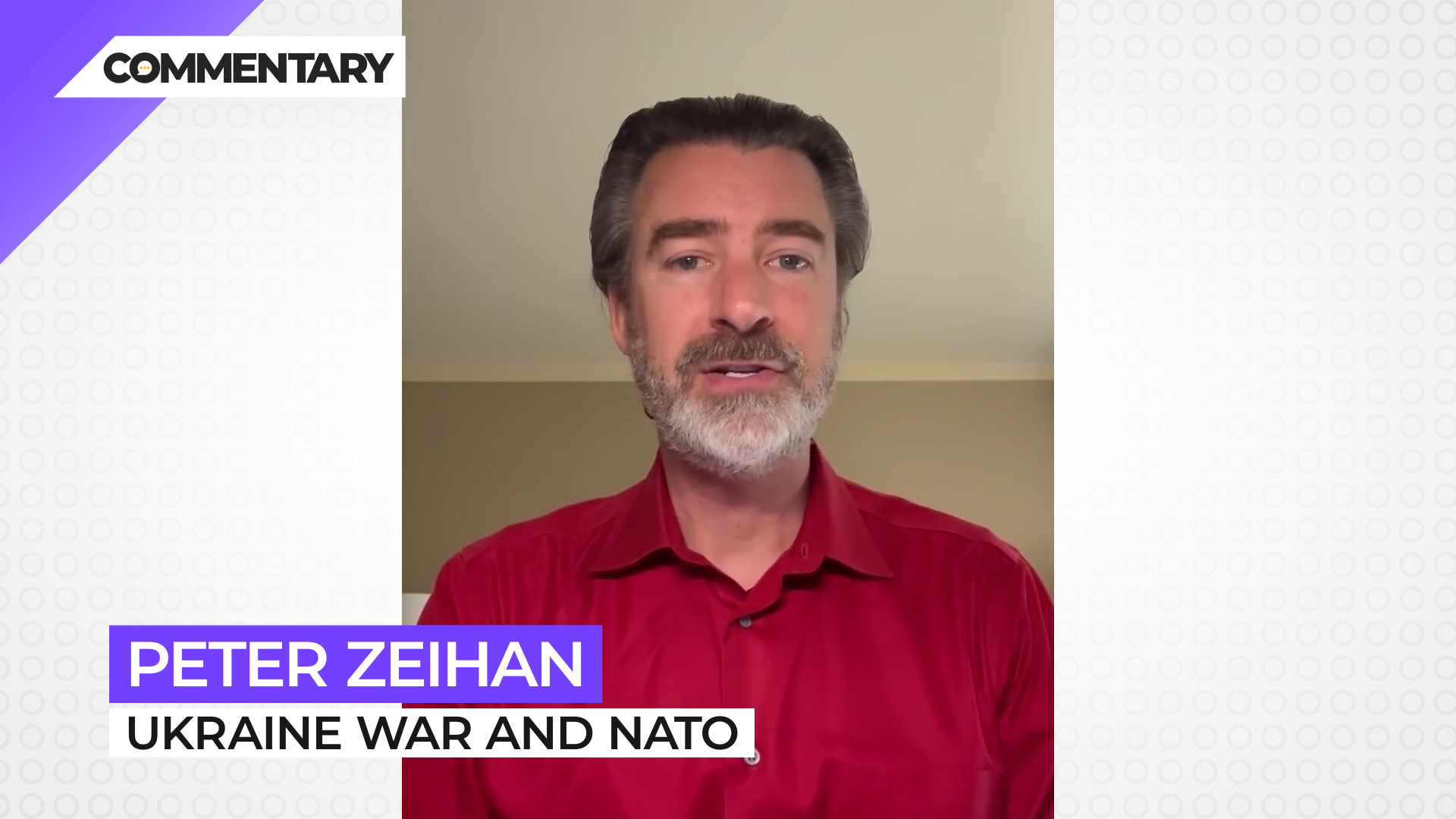
Commentary
-
Our commentary partners will help you reach your own conclusions on complex topics.
Hello, everyone. Peter Zeihan here coming to you from a super exciting hotel room in downtown Dallas. Hmm, fancy.
Today I wanted to talk about what’s going on with the war in Ukraine, from an Alliance point of view, specifically NATO.
On May 18, the Swedes and the Fins submit submitted a joint application to join, excuse me, the NATO Alliance to the excitement of many countries around the region including the Germans, including the French, including the Brits, including the Americans and the Canadians.
Even the Italians seemed really excited, but one country did not. And that one country is Turkey.
Now the Turks charge that there are a number of countries out there, including most notably Sweden, who have been providing too much assistance to groups the Turks don’t much care for. The group in question are the Turkish, excuse me, the Kurdish militias that operate not just in Turkey, but specifically in Syria and who have been part of the Syrian Civil War now, since it’s beginning, about what are we seven years ago now.
The Turks say that as long as countries are funding or arming or politically supporting groups that are shooting at Turks, they can’t be considered allies. Now, while the big issue of the day remains Russia and the Ukraine war, the Turks have a point. It’s difficult to imagine countries being militarily allied with countries who are then working to undermine their own security. And in the NATO Alliance, each individual country has full veto power over who can join. So if the Swedes and the Fins cannot have a heart to heart with Turks over what is possible and what is not possible, the Swedes will not get in.
Just as Russia is an issue of paramount import to the Swedes, the Fins, the Poles, and others, Turkey considers the Kurdish issue to be an issue of paramount import.
And since they have veto power, they will use it unless they get their way.
What the Swedes and the Fins are discovering is that if you want to be part an Alliance, you have to make your peace with everyone who is there already. And that encourages countries to see the world through the eyes of other places.
One of the reasons why the American alliance system has been so successful, going back to the 1940s is that the Americans are pretty good at this because they have their fingers in a lot of pots. And so it’s easy for us as Americans to understand the security concerns of Poland and Japan at the same time, because we’re active in both places, but the reverse is not necessarily true. The Poles don’t understand the security implications of Japan or Korea and vice versa because they have no interest in that area. So it’s very easy for these countries to play it fast and loose in someone else’s region and really not care.
NATO makes this a little bit more awkward because the NATO Alliance is now 30 countries, and they have interest in Africa. They have interest in the Caribbean. They have interest in South America. They have interest in the former Soviet space and it takes the United States to kind of corral the cats, so to speak, to make sure that everyone is seeing everything from everyone points of everyone’s point of view. And it doesn’t always work.
But for Sweden and Finland, this is a first. Sweden has been out of the great power game since the, since the Napoleonic wars. Finland, hasn’t been in the great power game at all. Their only concern has always been Russia, and they are going to have to find a way to pacify the Turks. And that probably means throwing the Kurds under the bus and, and sorry to the Kurds. This has happened over and over and over in history, but in order for the NATO Alliance to get what it wants, in order for the Swedes and the Fins to get what they want, they’re going to have to see this from Turks Turkey’s point of view.
Now this is hardly a new concept. It happens anytime there’s an alliance that touches more than one region. I think the quad in the Pacific and the Indian Ocean is a great example. Now, the quad is an informal grouping of four countries: India, Australia, Japan, and the United States with kind of the United Kingdom as a off and again on again, number member that is designed primarily to hedge in the Chinese to exchange political and technological information in order to work towards that goal.
Now, the Australians have been working with the Americans for a very long time. They understand that the Americans have fingers in a lot of pot, a lot of pots and are usually pretty good at understanding different points of view. The Japanese, less so. They used to have a extra regional empire; it was destroyed in World War II. And they’ve kind of spent the rest of the time since then cowering in the Americans’ shadow.
That started to loosen up a little bit.
And the Japanese government has flat out paid extortion money to the Trump administration in order to make sure they were still part of the American alliance structure. So there’s an understanding in Tokyo that if the American say something is good and needed to be done, the Japanese pretty much snapped too.
Great example there would be the sanctions on Russia. Japan, despite trying to be neutral on all things Russia since World War II, was the third country to sign up for the sanctions package, which leaves India.
India is an independent poll in international affairs. They have a country that they’re really concerned about, two really, Pakistan and especially China. And it doesn’t really sink in with the Indians that there are other countries that might have concerns.
So the Indians have turned into the biggest sanctions buster of the Ukraine War so far. Even the Chinese are drastically reducing their imports and exports to and from Russia. But the Indians are doing the opposite because they have not yet learned that an alliance means you have to see the world through someone else’s eyes.
So Sweden, India, same general problem. And at some point they’re going to decide that partnership with other countries is worth them swallowing some policies that those other countries don’t much care for.
For the Turks, it’s the Kurds. For the Indians, it’s gonna be the Russians. We’re not there yet, but we’re getting there pretty quick because de-globalization is picking up speed, and international supply chains are breaking down, and countries very soon are gonna have to pick sides and decide what it is that they can live with and what it is they can live without. And that’s as true for foreign policy and morals as it is for semiconductors and cars. That’s where we’re headed.
Okay. So my projection here is that the Swedes will abandon the Kurds and that the Turks will approve Swedish and Finish membership in NATO, but they’ve gotta have that conversation first. The first round of that started this week. Negotiations next week probably will get us exactly what we need. There’s an interest on both sides for this being resolved quickly. All right. That is it from me until next time.
-
Hurricane Helene hits US coast, Appalachia and beyond
Hurricane Helene hit Florida and Georgia overnight between Sept. 26 and 27 as a Category 4 hurricane, and accompanying storms will continue reaching deeper into the continental United States today. Dangerous flash flooding from the hurricane, known as storm surge, was some of the worst flooding that the Tampa Bay area has ever seen, and… -
Israel holds upper hand against Lebanon, Hezbollah and Iran
On Wednesday, Sept. 25, Hezbollah launched a ballistic missile at Tel Aviv in retaliation for Israel’s explosive pager attack that blew up devices across Lebanon. Although Israel’s defense systems intercepted the surface-to-surface missile, the attempted strike on Tel Aviv marked a significant escalation by Hezbollah. Since the siege on Gaza began, shortly after the Oct. 7, 2023,… -
The Sinaloa Cartel civil war
Fears of a civil war within the Sinaloa Cartel are growing as violence between competing factions within the cartel continues. The Mexican Army has dispatched around 600 elite troops to Sinaloa to help quell those fears, in addition to roughly 2,200 regular soldiers and National Guard. Watch the above video as Straight Arrow News contributor… -
New Ukrainian weapons hit Russia where it hurts
Ukrainian drones struck a major Russian ammunition depot, triggering a massive explosion that was captured on camera. According to the Ukrainian military, 2,000 tons of munitions had arrived at the depot before the attack. Over the past two years, Ukraine has significantly increased its domestic drone production, allowing it to scale up attacks on military… -
Weighing social costs vs. economic benefits on immigration
Global human migration is one of the defining elements of our current historical era, according to the United Nations. Migrants face both the incentives to leave — forced out by climate change, crime and corruption, extreme poverty or violence — and incentives for where to go, based on available job opportunities and so on. Migration…
Latest Stories
-
 Getty Images
Getty Images
‘Legacy on Ice’ fundraiser honors victims of DC plane crash and first responders
-
 Getty Images
Getty Images
Trump frustrated as Zelenskyy says end to war very very far away
-
 Getty Images
Getty Images
Trump unveils $165 billion investment by Taiwan chipmaker giant TSMC
-
 Getty Images
Getty Images
Trump to put tariffs on agricultural imports, tells farmers to ‘have fun’
-
 SC Johnson
SC Johnson
SC Johnson enlists hermit crab in push to campaign against plastic pollution
Popular Opinions
-
In addition to the facts, we believe it’s vital to hear perspectives from all sides of the political spectrum.
Latest Opinions
In addition to the facts, we believe it’s vital to hear perspectives from all sides of the political spectrum. We hope these different voices will help you reach your own conclusions.
The opinions published in this section are solely those of the contributors and do not reflect the views of Straight Arrow News.





















Latest Commentary
We know it is important to hear from a diverse range of observers on the complex topics we face and believe our commentary partners will help you reach your own conclusions.
The commentaries published in this section are solely those of the contributors and do not reflect the views of Straight Arrow News.
Dr. Frank Luntz
Pollster and Political Analyst‘Biased’: What Americans think of ‘mainstream media’
‘Getting rid of them’: Americans discuss Trump and immigration
‘Woke’: Why some Biden 2020 voters backed Trump in 2024